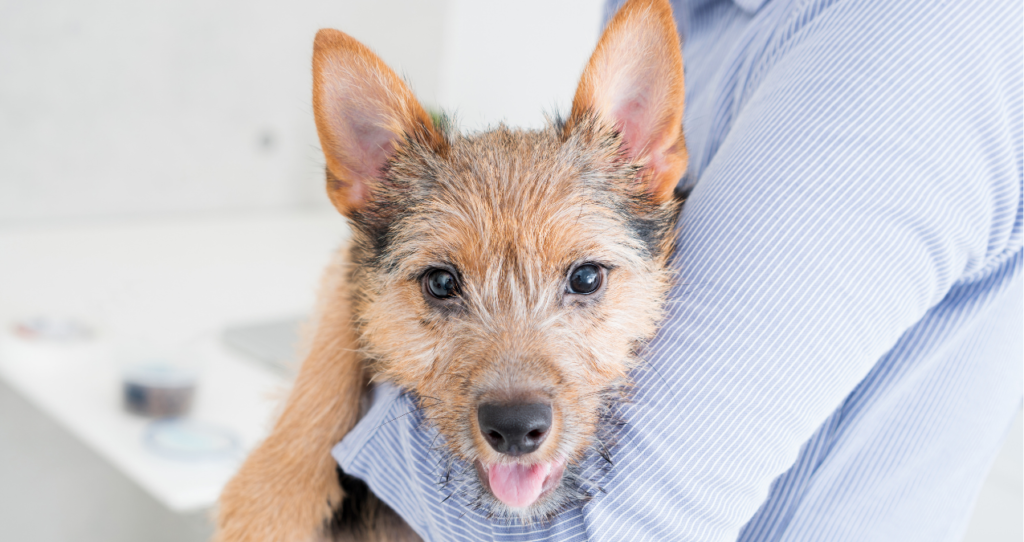Have you noticed your dog's anxiety levels increase throughout the Covid-19 pandemic? Studies have shown that hyper-attachment to owners is significantly associated with separation anxiety.
We are all home more due to lockdowns, so your dog’s attachment to you increases. Then when you can get out more and you leave them at home, your dog’s anxiety levels can increase too.
This is a particular concern for dogs which are already prone to separation anxiety. Thankfully, anxiety in canines can be managed through various behavioural and medicinal treatments.
What is separation anxiety in dogs
According to the RSPCA, ‘separation related behaviour (SRB) is behaviour that only occurs when the dog is separated from their owner and in many cases is because they are feeling distressed. Tell tale indicators include destructive behaviour, unwanted toileting or reports of howling/barking.’
Symptoms of separation anxiety in dogs
When it comes to separation anxiety, some symptoms can be obvious whereas others can be more subtle.
These are the most common behavioural signs of separation anxiety:
- Extreme following of the owner
- Destructive behaviour (targeted at the door you left the house from), or chewing and destroying furniture
- Excessive greeting
- Various types of vocalisation (howling and barking whilst you’re leaving the house is a sign of departure cue anxiety)
- Toileting (conducting bathroom business in strange places)
Less frequent, easily missable signs include:
- Trembling, whining or pacing
- Excessive salivation
- Self-mutilation
- Repetitive behaviour
- Vomiting
How to calm an anxious dog
If your dog is suffering from any form of anxiety, it’s important to discuss with your veterinarian who can assist with a plan to settle the anxieties and relieve any related pain.
Some of the steps in this plan may include:
Removing Triggers That Cause Your Dog’s Anxiety
A veterinarian can help to identify possible stressors and, once identified, it becomes a simple matter of removing these stressors to test whether your dog’s anxiety lessens.
Exercise With Your Dog
Exercise is always a good idea. For dogs, in particular, a daily walk can result in lower levels of aggression, fear, and separation anxiety.
Create a Sanctuary Space
Some dogs get so anxious that any external stimuli will set them off. That is why it is important to have a sanctuary space for your dog to find solace when it needs it.

Dog anxiety medication
Before resorting to medication, it is important to exhaust all behavioural therapies.
Many pet owners like to consider natural treatments and medications, before the prescribed pharmaceutical options.
The most commonly prescribed pharmaceutical medications used to treat dog anxiety are:
- Alprazolam (Xanax)
- Amitriptyline
- Buspirone
- Clomipramine (Clomicalm)
- Dexmedetomidine (Sileo)
- Diazepam (Valium)
- Fluoxetine (Reconcile or Prozac)
- Lorazepam (Ativan)
- Paroxetine (Paxil)
- Sertraline (Zoloft)
Natural products to help dogs with separation anxiety
CBD oil is a natural option for anxiety in dogs, and is being considered by veterinarians and pet owners who prefer a more holistic approach to their pet’s health.
Other natural products to consider which may help dogs with separation anxiety include herbs such as St. John’s Wort, Flower Essences and Essential Oils.
Some vet clinics also consider treatments such as body work and acupuncture along with behavioural therapy .
CBD oil for dog separation anxiety
The advent of medicinal cannabis treatment for anxiety in humans has led to veterinarians now considering prescribing CBD oil for animals, now available in Australia through CBD Vets Australia.
There is little research directly on the effects of CBD oil for pet anxiety. However, over the past few years, medicinal cannabis companies are exploring how CBD may reduce anxiety in dogs particularly after feedback from pet owners about their personal experiences.
Recent research in humans, and in other preclinical investigations, have shown CBD oil may reduce feelings of anxiety and symptoms of PTSD. This is due to its interactions with receptors in the brain and central nervous system that modulate hormones and signals related to anxiety and fear responses.
Similarly, CBD oil may reduce the expression of anxiety in dogs such as barking, whining, noise phobias, separation anxiety, pacing, and other signs of distress or discomfort.
Hemp oil or CBD oil for dog anxiety?
You may have seen hemp products advertised for your dog indicating they may help calm anxious dogs.
Wondering what the difference is between hemp seed oil and cbd oil?
Let’s look at the key features that differentiate hemp seed oil and CBD oil:
- CBD oil has more potential benefits.
Hemp seed oil is rich in some vitamins, minerals, and essential fatty acids. It’s omega-3 and omega-6 composition, in particular, means these nutrient-dense seeds offer a variety of health benefits for humans and animals.
On the other hand, CBD is well-known for its therapeutic effects with health benefits that go beyond the scope of regular hemp seed oil.
CBD oil can be prescribed to humans for health concerns such as chonic pain and epilepsy, along with showing promise for relieving stress, assisting with sleep issues and it may alleviate symptoms of joint pain and arthritis. CBD oil is currently approved by the TGA for epilepsy, multiple sclerosis, chronic pain, nausea and vomiting and palliative care.
- Thee natural products are not made in the same way.
Hemp seed oil is usually made through cold-pressing hemp seeds to create a highly concentrated oil, rich in nutrients.
CBD oil, alternatively, is extracted from the whole hemp plant and contains more beneficial plant compounds, like cannabinoids and terpenes.
- The TGA views hemp seed oil and CBD oil differently.
Hemp seed oil has been considered a food in Australia since 2017 so can be purchased at food stores and included in pet food products.
CBD oil containing more than 98% cannabidiol is classified as a Schedule 4 drug and can only be prescribed by doctors for certain health conditions and by veterinarians for animals.
Conclusion
If your dog is suffering from separation anxiety know that there are a number of treatments which may help. It’s important to discuss a plan with your vet.
CBD Oil is an exciting new natural treatment option in animal health care and is worth considering for a number of different health conditions in dogs including anxiety.
Be aware that not all CBD oil is the same and buying CBD oil online is illegal.
As you investigate the cause of your dog’s separation anxiety and test out some solutions, it’s worth talking to your vet about a natural option like CBD.
If you have any questions please contact CBD Vets Australia or talk to your local vet and refer them to CBD Vets Australia. Prescribing CBD online for vets is simple!




